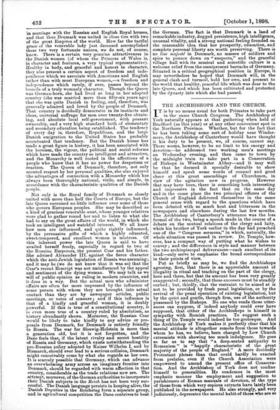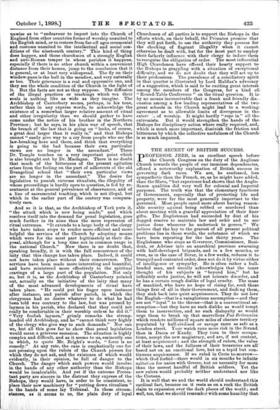THE ARCHBISHOPS AND THE CHURCH.
IT is by no means usual for both Primates to take part in the same Church Congress. The Archbishop of York naturally appears at that gathering when held at Bradford (as this year) or at any other convenient spot in the Northern Province. Whether, but for the fact that he has been taking some sort of holiday near Winder- mere, the Archbishop of Canterbury would have thought it his duty to be present, we, of course, cannot say. There seems, however, to be no limit to his energy and devotion—he addressed two working men's meetings on Wednesday evening, and then came to town by the midnight train to take part in a Consecration of Bishops in Westminster Abbey—and it may well be that he deemed it specially desirable to show himself and speak some words of counsel and good cheer at this great assemblage of Churchmen, in view of the agitation now in progress. However that may have been, there is something both interesting and impressive in the fact that on the same day and in the same place the two principal officers of the Church of England delivered themselves in the same general sense with regard to the questions which have been debated with so much heat and bitterness in the newspapers and elsewhere during the last few months. The Archbishop of Canterbury's utterance was the less formal of the two, being a speech made in the course of a debate on the mutual relations of the clergy and laity, while his brother of York earlier in the day had preached one of the " Congress sermons," in which, naturally, the whole situation was passed in review. Dr. Temple, how- ever, has a compact way of putting what he wishes to convey ; and the differences in style and manner between the two archiepiscopal deliverances—each excellent of its kind—only serve to emphasise the broad correspondence in their points of view.
Put as briefly as may be, we find the Archbishops agreeing, first, that there is an appreciable amount of illegality in ritual and teaching on the part of the clergy, here and there, but that its amount has been very greatly exaggerated ; secondly, that these excesses must be steadily curbed ; but, thirdly, that the restraint to be aimed at is not to be provided by fresh penal legislation, or by the revival of the penal operation of existing legislation, but by the quiet and gentle, though firm, use of the authority possessed by the Bishops. No one who reads these utter- ances can suppose, if indeed anybody could ever have supposed, that either of the Archbishops is himself in sympathy with Romish practices. To suggest such a thing of Dr. Temple would indeed be too grotesque. And the Archbishop of York makes it perfectly clear that his mental attitude is altogether remote from those towards whom he has, we believe, been charged by Low Church extremists with showing too much indulgence. He goes so far as to say that "a deep-seated antipathy to Romanism " is " happily characteristic of the great majority of the people of England." A more decidedly Protestant phrase than that could hardly be exacted from prelates, even if the Church Association were empowered to amend the present office of Consecra- tion. And the Archbishop of York does not confine himself to generalities. He condemns in the most emphatic manner the employment and suggestion to parishioners of Roman manuals of devotion, of the type of those from which very copious extracts have lately been published in the newspapers. He also strongly, and very judiciously, deprecates the mental habit of those who are so unwise as to "endeavour to import into the Church of England from other countries forms of worship unsuited to the English mind, or to restore from far-off ages ceremonial and customs unsuited to the intellectual and social con- ditions of the nineteenth century." This kind of thing does happen, and those churchmen of a strongly English and anti-Roman temper in whose parishes it happens, especially if there is no other church within a convenient distance from their homes, jump to the conclusion that it is general, or at least very widespread. The fly on their window-pane is the bull in the meadow, and very naturally so too. Their grievance is a real and oppressive one, and they see the whole condition of the Church in the light of it. But the facts are not as they suppose. The diffusion of the illegal practices or teachings which vex their souls is nothing like as wide as they imagine. The Archbishop of Canterbury seems, perhaps, in his tone, rather than in any express words, to acknowledge the existence of a somewhat larger relative amount of ritual and other irregularity than we should gather to have come under the notice of his brother in the Northern Province ; but he says, in his plain way of speech, that the breach of the law that is going on " looks, of course, a great deal larger than it really is," and that Bishops cannot " easily give way to a cry from people who see the law-breaking here and there, and think that everything is going to the bad because their own particular views are no longer in the ascendant." There Dr. Temple touches on a very important point which is also brought out by Dr. Maclagan. There is no doubt that much of the bitterness of the present agitation arises from the feeling on the part of adherents of the old Evangelical school that " their own particular views are no longer in the ascendant." The desire for legislation to punish extreme ritualists, the illegality of whose proceedings is hardly open to question, is fed by re- sentment at the general prevalence of observances, and of a line of sacramental teaching, which is not illegal, but which in the earlier part of the century was compara- tively rare.
And so it is that, as the Archbishop of York puts it, " the attack which is now being made," and which resolves itself into the demand for penal legislation, goes much further in its aims than the mere repression of ritual extremes. "It extends to a large body of the clergy who have taken steps to render more efficient and more helpful the services of the Church by adopting means which were for the most part legitimately at their dis- posal, although for a long time not in common usage in the national Church." Now there is no doubt that, speaking broadly, it is with the full concurrence of the laity that this change has taken place. Indeed, it could not have taken place without their concurrence. The services have been made more interesting and beautiful, and have ministered more effectively to the spiritual cravings of a large part of the population. Not only so, but it is, as the Archbishop of Canterbury pointed out, actually on the initiative of the laity that many of the most advanced developments of ritual have taken place. "He could put his finger upon instance after instance, and parish after parish, in which the clergyman had no desire whatever to do what he had been told was contrary to the law, but was pressed by laymen in his parish, who declared that they could not really be comfortable in their worship unless he did it." " Very foolish laymen," grimly remarks the strong- headed old Archbishop, and he "cannot think very highly of the clergy who give way to such demands." Nor can we, but all this goes far to show that penal legislation would mean a grievous secession. The situation is highly complex and difficult, and as it seems to us, eminently one in which, to quote Mr. Bright's words, " force is no remedy." At any rate, the case is emphatically one for not pressing upon the rulers of the Church powers for which they do not ask, and the existence of which would evidently, in their opinion, be full of danger to the Church. 'The danger which such powers would involve in the hands of any other authority than the Bishops would be incalculable. And yet if the extreme Protes- tant party are sincere in the distrust they express of the Bishops, they would have, in order to be consistent, to place their new machinery for " putting down ritualism " in the hands of some lay Tribunal. In these circum- stances, as it seems to us, the plain duty of loyal Churchmen of all parties is to support the Bishops in the efforts which, on their behalf, the Primates promise that they will put forth, to use the authority they possess for the checking of flagrant illegality when it cannot otherwise be dealt with, but for the most part to employ their fatherly influence with their clergy to induce them to recognise the obligation of order. The most influential High Churchmen have offered their hearty support to the Bishops in grappling with a situation of exceptional difficulty, and we do not doubt that they will act up to their professions. The prevalence of a conciliatory spirit in that quarter is illustrated by Lord Halifax's advocacy of a suggestion, which is said to be exciting great interest among the members of the Congress, for a kind ofi, "Round-Table Conference " on the ritual question. It is. by no means inconceivable that a frank and friendly dis- cussion among a few leading representatives of the two. great schools in the Church might lead to a working. agreement as to allowable limits of divergence in the. exterr 1. of worship. It might hardly " rope in " all the. extremists. But it would strengthen the hands of the- Bishops for disciplinary action where really required, and, which is much more important, diminish the friction and bitterness by which the collective usefulness of the Church is so much impaired.







































 Previous page
Previous page